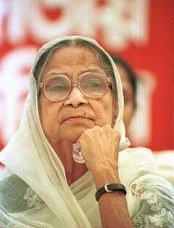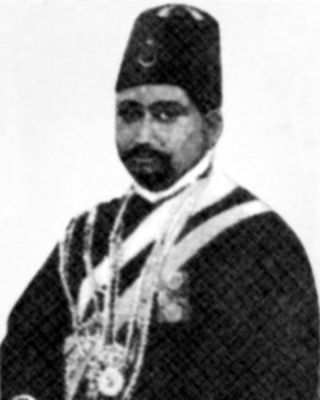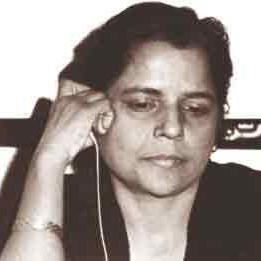Related Research Articles

The Bangla Academy is the official regulatory body of the Bengali language in Bangladesh. It is an autonomous institution funded by the Government of Bangladesh that fosters the Bengali language, literature and culture, works to develop and implement national language policy and conducts original research in Bengali. Established in 1955, it is located in the Burdwan House in Shahbagh, Dhaka, within the grounds of the University of Dhaka and Suhrawardy Udyan. The Bangla Academy hosts the annual Ekushey Book Fair.

Rokeya Sakhawat Hossain, commonly known as Begum Rokeya, was a prominent Bengali feminist thinker, writer, educator and political activist from British India. She is widely regarded as a pioneer of women's liberation in Bangladesh and India.

Begum Sufia Kamal was a Bangladeshi poet, feminist leader, and political activist. She took part in the Bengali nationalist movement of the 1950s and civil society leader in independent Bangladesh. She led feminist activism and was a president of Bangladesh Mahila Parishad. She died in 1999 and was the first woman to be given a state funeral in Bangladesh.

Syed Ismail Hossain Siraji was a Bengali author and poet from Sirajganj in present-day Bangladesh. He is considered to be one of the key authors of period of the Bengali Muslim reawakening; encouraging education and glorifying the Islamic heritage. He also contributed greatly to introducing the Khilafat Movement in Bengal, and provided medical supplies to the Ottoman Empire during the Balkan Wars. Anal-Prabaha, his first poetry book, was banned by the government and he was subsequently imprisoned as the first South Asian poet to allegedly call for independence against the British Raj. The government issued Section 144 against him 82 times in his lifetime.
Shahed Ali was a Bangladeshi litterateur and cultural activist. Aside from being an educationist and his journalism, he was one of the founders of the nationwide Tamaddun Majlish which initiated the Bengali language movement. He edited multiple magazines, was the founding secretary of the Islamic Academy, and is best known for his magnum opus, the short story Jibrailer Dana.
Abu Naser Muhammad Gaziul Haque was a language activist and an activist leader during the Bengali Language Movement.

The Sufia Kamal National Public Library is the largest public library in Bangladesh and houses the central administration of the Department of Public Libraries, under the Ministry of Cultural Affairs. The library was named "Central Public Library" between 2004 and 2010. The library is located in Dhaka's Shahbag neighbourhood.

Hakim Habibur Rahman was an Unani physician, litterateur, journalist, politician and chronicler in early 20th-century Dhaka.

Nurjahan Murshid was a journalist and teacher, a Bangladesh cabinet minister, and social activist.

The Sangbad is a Bengali-language daily newspaper, founded in 1951 and published from Dhaka, Bangladesh. It is the oldest newspaper in Bangladesh.
Mohammad Nasiruddin was a Bangladeshi journalist and progressive thinker. He became an important reformer of Muslim Bengal in early 20th century and provided platform for female writers. He received Ekushey Padak in 1977 and Independence Day Award in 1984 from the government of Bangladesh.
Abdul Quadir was a Bangladeshi poet, essayist, and journalist. He was the recipient of Bangla Academy Literary Award in 1963 and Ekushey Padak in 1976.

Nurjahan Begum was the first female journalist in Bangladesh and a trailblazer for female journalists in South Asia. Begum was awarded Ekushey Padak in 2011 by the Government of Bangladesh. She served as the editor of Begum magazine.
Begum Rokeya Padak, named after Begum Rokeya, is a Bangladeshi national honour conferred on individual women for their exceptional achievement. The award is given by the Ministry of Women and Children Affairs of the Government of Bangladesh. First awarded in 1995, the Rokeya Padak recognises the pioneering contribution of an individual in empowering women and raising women's issues.

Feminism in Bangladesh seeks equal rights of women in Bangladesh through social and political change. Article 28 of Bangladesh constitution states that "Women shall have equal rights with men in all spheres of the State and of public life".

Rokanuzzaman Khan was a Bangladeshi journalist and litterateur. He was awarded Ekushey Padak in 1998 by the Government of Bangladesh. He was the founder director of children's organization Kochi Kanchar Mela.

Pratibha Mutsuddi is a Bangladeshi academic and language activist. She participated in the Bengali Language Movement in 1952. She served as the director and principal of Kumudini Welfare Trust, a welfare foundation founded by Ranadaprasad Saha in 1947. She was awarded Ekushey Padak in 2002 by the Government of Bangladesh for her contribution to education.
Anannya Literature Award is the prize for women in Bangladesh recognition of contribution to the field of literature by Anannya Magazine in every Bengali year since 1401.
References
- 1 2 3 4 5 Islam, Sirajul (2012). "Begum". In Islam, Sirajul; Rahman, Bilkis (eds.). Banglapedia: National Encyclopedia of Bangladesh (Second ed.). Asiatic Society of Bangladesh.
- 1 2 3 4 Promiti Prova Chowdhury (May 24, 2016). "Pioneering editor Nurjahan Begum dies". Dhaka Tribune. Retrieved June 11, 2016.
- ↑ "Bangladesh's first female journalist, Nurjahan Begum, dies at 91". BBC News. May 23, 2016. Retrieved June 11, 2016.
- 1 2 Naziba Basher (May 20, 2016). "Begum: How One Magazine Began a Revolution". The Daily Star. Retrieved June 11, 2016.